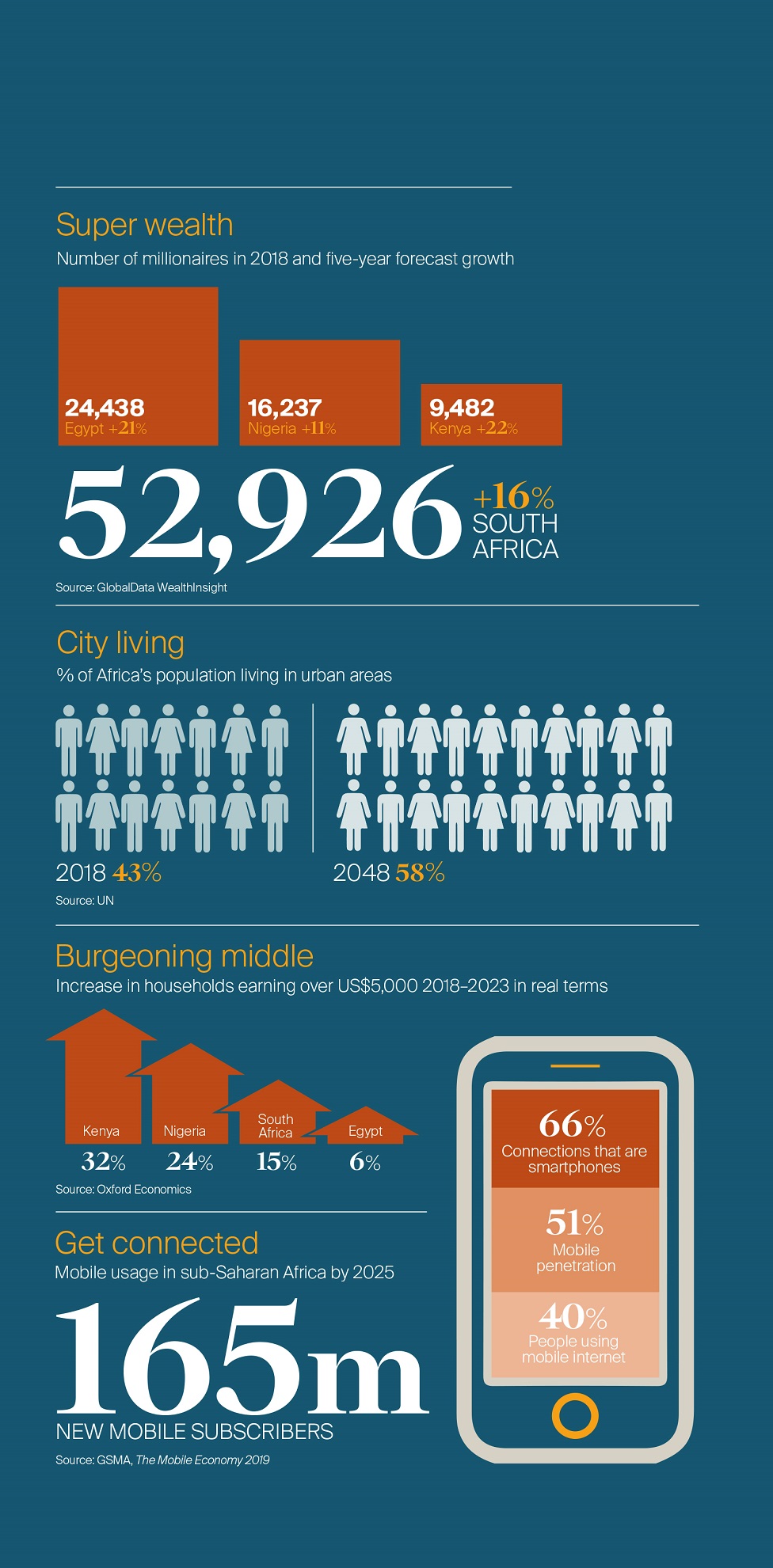The big five: Key economic themes set to drive growth across Africa
Africa’s growing economic heft is slowly asserting itself globally, and nowhere more so than in real estate, where opportunities for shrewd, forward-thinking investors and developers abound. We look at the big five influencing factors driving growth and industry and enterprise. Download Africa Horizons 2019.
3 minutes to read
Economic growth
Economic growth is forecast to accelerate to 4% this year, up from 3.5% in 2018, according to the African Development Bank. This is a significant rebound from 2016, when growth slowed to just over 2% following sharp commodity price falls.
Africa is gaining significant economic momentum, and this is set to continue. East Africa will see the strongest growth at almost 6%, extending a prolonged period of outperformance by the region, where economic success is led by diversification.
A potential driver of future growth could be the African Continental Free Trade Agreement, which promises to remove 90% of tariffs on goods moving between 49 countries, and liberalise trade in services.
So far, 19 nations have ratified the agreement, which will come into force once 22 signatories have affirmed the treaty.
Affluent Africa
By 2023 more than 46% of African households will have an annual income of over US$5,000, up from 41% in 2018, according to Oxford Economics. The number of households with an income of over US$20,000 is forecast to rise by 32% to 17 million over the same period.
This will result in greater consumerism, and more sophisticated patterns of spending and private investment, particularly as stronger growth is expected for higher income bands.
This means much more than just busier shops. A growing number of Africans will be in a position to invest in their children’s future, resulting in higher school and university enrolment. Demand will increase for personal investment products like pensions and mutual funds, boosting financial services firms.

Competitive capital
A 2017 McKinsey report estimated the annual revenue for Chinese firms in Africa at US$180 billion, with a potential surge to US$440 billion by 2025.
In 2018, Africa’s exports to China jumped by 31% to US$100 billion, according to the Chinese Ministry of Commerce. India’s Ministry of Commerce and Industry says trade with Africa increased by 22% to US$63 billion in the 2017/18 fiscal year.
Growing competition between these emerging powers and countries with longer-standing economic ties, such as the UK, US and France, to win lucrative investments and open up new trade, should put African nations and businesses in a stronger position to negotiate a bigger share in the profits.
Tech revolution
In 2018, Google said it planned to open an artificial intelligence laboratory in Accra, Ghana. Its Launchpad Accelerator programme will offer support and advice to start-ups in 17 African countries in 2019.
Csquared, another company owned by Google’s parent, Alphabet, has been busy constructing fibre optic networks in cities including Accra, Entebbe, Kampala and Monrovia. These tech innovations have the potential to transform all aspects of business and daily life.
Mobile phones allowed widespread telecoms services in parts of Africa without landline networks, and provided a platform for other services, such as e-money in Kenya. Drones could have a similar impact, delivering goods to remote communities and mapping the areas they fly over, enabling further development.
Green power
Africa could be one of the beneficiaries from the revolution unfolding in the market for renewable energy. Between 2010 and 2017, the average cost of producing solar energy fell by 73%, while onshore wind power dropped 22%, according to the International Renewable Energy Agency.
BP’s 2018 Energy Outlook report predicted a 40% increase in power consumption for Africa between 2020 and 2030, which will make renewables an attractive option.
Renewable energy will spur economic growth in Africa by getting electricity to remote communities. Countries without their own oil were previously vulnerable to energy price spikes, so renewable power could be a game-changer. Cheap and abundant electricity will help many African nations to develop their manufacturing industries and irrigate land.